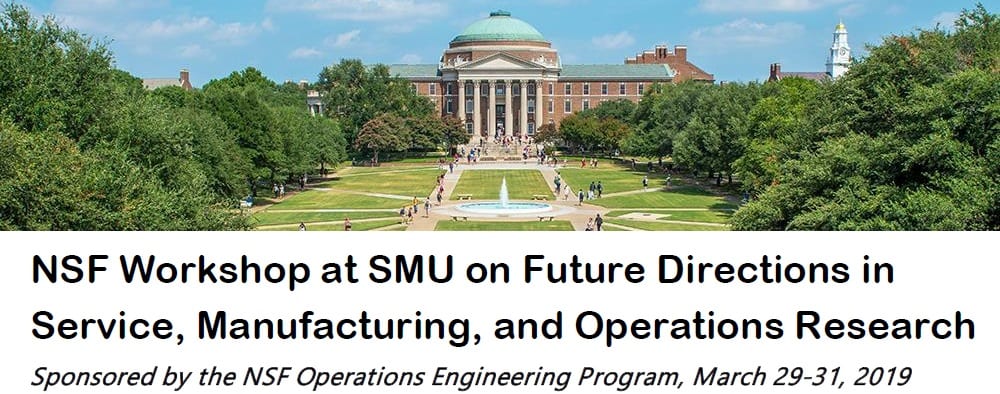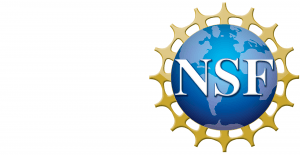Welcome to the webpage of the NSF Operations Engineering (OE) Program Future Directions Workshop to be held at Southern Methodist University (SMU), Dallas, TX, on March 29-31, 2019. This workshop is funded by NSF, Grant Number CMMI 1650203. In these pages, you will find general information about the workshop (below) and information on how to apply and registration as well as on travel and accommodation.
Important Dates:
Application Deadline: January 31, 2019 (Closed)
Please Complete Your Registration by February 11, 2019 (Closed)
Contact: The chair of the workshop is Halit Uster in the EMIS Department at SMU and he can be reached via email at ws-uster@smu.edu
Workshop committee members include (in alphabetical order) Sila Cetinkaya , Harsha Gangammanavar, and Aurelie Thiele.
General Information on the Workshop
Background and Objectives
The goal of this workshop is to bring together researchers and practitioners working in the fields of service, manufacturing, and operations research with the purpose of identifying promising future research directions with significant impact on theory and practice. The workshop will also serve as a venue for participants to display their research via posters to share their findings and receive feedback from colleagues and program directors (please see the Applications tab).
Our community works on both innovative applications and foundational research. Sometimes, new applications provide the motivation for foundational work, and other times, new methodological tools make it possible to create innovative new applications/solutions. On the other hand, recent developments in information technologies have resulted in exponential rates of increase in availability of data and computational abilities. These developments provide an invaluable opportunity for our research community, which is singularly well-poised to help transition from data to models to decisions. With this in mind, the purpose of this workshop is to provide a forum where participants’ input can help shape future research directions for our research community.
Framework
The workshop will bring together researchers and practitioners with different backgrounds and research/application areas to interact in an effort to identify opportunities and challenges for the OE research community. It aims to achieve this in an integrated framework with a focus on both applications and methodologies connected via big data to address realistic solutions to societal problems. Finally, in the wake of explosion in data availability and many recent practices it facilitates, the workshop will provide the opportunity to identify a roadmap for curricular changes in teaching OR/MS/Analytics theory and practice to next generation engineers and decision-makers.
The workshop will facilitate discussions on three interconnected topics including societal impact, interface of OR/MS/Analytics with human behavior and organizational behavior/change, and analytics curricula updates. These high-level discussions will be facilitated via specific contexts including supply chain/logistics and healthcare engineering systems. These application areas collectively represent a significant portion of the service economy in the US and embody important problems that cross-cut contexts that relate to the topical areas in the scope of the workshop.
The workshop will initiate with two keynotes focusing on Supply Chain and Healthcare Delivery systems to provide context and to set the stage for discussions on future directions regarding especially the first two main topical areas (societal impact and high-touch systems). We will have another keynote on Analytics Education as analytics education in the presence of big data relates closely to both topical areas as well as the context areas in practice of data-to-decisions process. The keynotes are aimed to stimulate discussions in the following breakout sessions also helping to expand the questions base (below) for the breakout sessions.
Our keynote speakers are
Jeffrey Camm, Associate Dean of Business Analytics and the Inmar Presidential Chair of Analytics at the Wake Forest University School of Business on Analytics Education,
Mark P. Van Oyen, Professor from Industrial and Operations Engineering at University of Michigan on Healthcare Delivery Systems, and
Chelsea C. White III, Schneider National Chair in Transportation and Logistics and Professor from Industrial and Systems Engineering at Georgia Tech on Supply Chain/Logistics Systems.
The keynotes will be followed by multiple breakout sessions each with 10-12 participants. Discussions in each breakout session will be recorded by a scribe in a document shared by the members of the breakout session. Later, these discussion notes will form the basis for a workshop report on future directions in the OE program, from the perspective of the research community, to be submitted to NSF.
Specific Topics of Discussion and Final Report Components
In the first topic, the focus will be on future directions of research that connect methodologies and applications through data availability (with both increased size and variety available today) in realistic applications for societal impact.
A sample set of questions to be answered include (but not limited to)
+ How to measure societal impact; what are the critical areas (problem types vs. application areas) for impact; where are the opportunities for far-reaching impact via inter-disciplinary collaboration.
+ Recognizing that topics covered by the OE Program are enablers of new products, processes, and services, but not owners, how do we create/communicate a better understanding of what we (can) do; what areas are the most critical and offer the most opportunities towards this end; how can we create communities of OE researchers and users and creators of enabling technologies; what are the other mechanisms that NSF can foster such activities.
In the second topic, the discussion will focus on the efficiency and effectiveness at the interface between typical OE program research areas and the high-touch systems in which the B2B or B2C customer has a direct relationship with the provider (i.e., incorporating both the human and organizational behavior aspects). This is specifically motivated by the observation that, historically the focus of OE research is by-and-large on the design of systems and processes for low-touch products and services as opposed to high-touch in which the B2B or B2C customer (e.g., buyer and/or user of a product/service purchased online or offline) has a direct relationship (but not via an automated call center) with the provider as in consulting, financial services, healthcare services etc.
A sample set of questions to be answered include (but not limited to)
+ How can OR/MS contribute to improved quality and better design of interface at the front-end of high-touch services. How can the quality of high-touch services be measured and what design principles should be devised.
+ New paradigms for products/processes/systems for production and services (low- or high-touch) may also call for organizational changes and both have to go hand-in-hand, not necessarily one preceding the other. How can this be taken into account in crafting new paradigms; how can new approaches be reliably tested in a laboratory environment.
+ What are the effective ways and best practices to establish and/or nurture interaction among OR/MS researchers and human and organizational factors researchers to this end. How can NSF be instrumental specifically in facilitating such interactions.
+ What are the difficulties at the interface of OR/MS solutions and their implementation when humans are the users of the system in a distributed fashion and not necessarily in cooperation with each other; how to avoid and/or overcome these difficulties; what processes, tools, methods etc. to employ or develop towards pro-actively eliminate potential difficulties and/or to address them during or post-implementation.
Finally, as the third topic, in the wake of explosion in data availability and many recent industrial practices it facilitates, the workshop will provide the opportunity to identify a roadmap for curricular changes in teaching OR/MS/Analytics theory and practice to next generation engineers and decision-makers.
A sample set of questions to be answered include (but not limited to)
+ How do descriptive, predictive, and prescriptive analytics interact; what kind of curriculum should be established for an integrated analytics curriculum; how does it affect existing curricula in undergraduate and graduate programs.
+ How can NSF support development and test of such curricula that can span multiple divisions as they also connect to STEM education.
+ Assuming that data storage capability is (almost) limitless at low cost and the computing speed is increasing at an exponential rate, how can OR can take advantage of these resources; what are the new problems that can be solved; what are the implications on impact of OR in practice; and how can these opportunities be incorporated into the analytics curricula.
This workshop is funded by NSF, Grant Number CMMI 1650203.
It is also sponsored by the Lyle School of Engineering at SMU and Southern Methodist University (SMU).

